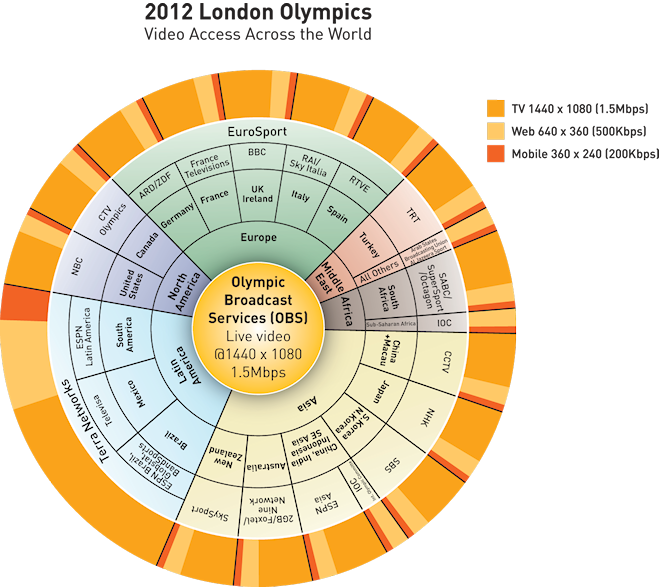Olympic Video Streams to Gobble 30 to 60 Percent of Internet Bandwidth
Californian-based technology firm Blue Coat Systems has predicted that 30-60% of internet traffic will be turned into “wasted bandwidth” as workers go online to watch the London 2012 Olympic Games via various video streaming services, which it fears could put ISP networks and productivity at risk.
BlueCoat, which has its own vested interest in selling exactly the sort of technology that could help to mitigate such concerns, notes that the standard video transfer size (worldwide average) during the 2008 Olympics in Beijing was just 200Kbps (0.2Mbps). But it claims that this has now increased to 500Kbps (0.5Mbps).
Advertisement
Furthermore online video viewing in general has become dramatically more popular over the same period of time. For example, during the 2008 games UK viewers watched 50 million online video streams (e.g. YouTube, iPlayer), which represents 558.8 Terabytes of data. During the 2012 Olympics, online video views could increase to 134.4 million (3.7 Petabytes).

BlueCoat’s fear is that this year’s event could end up costing businesses a lot of money, not just in terms of extra bandwidth but also from the lost productivity of workers. Furthermore it notes that a single user watching one video can consume as much as 30% of a T1 (1.5Mbps) or 25% of an E1 (2Mbps) connection. “With as few as three employees watching events, the network would be saturated,” claims BlueCoat.
As we keep saying, it’s certainly true that such events can strain capacity and result in slower performance, although most businesses and ISPs have by now adapted to handling such situations. Similarly the increases above, we believe, should not be considered in isolation of other changes.
For example, Cisco’s 2012 Visual Networking Index (VNI) forecast suggests that internet traffic as a whole tends to increase by three or four times every 3-4 years and bandwidth prices have, in many areas, also fallen. Online video content and TV services alone are expected to account for 54% of all consumer internet traffic come 2016.
Advertisement
Mark is a professional technology writer, IT consultant and computer engineer from Dorset (England), he also founded ISPreview in 1999 and enjoys analysing the latest telecoms and broadband developments. Find me on X (Twitter), Mastodon, Facebook, BlueSky, Threads.net and Linkedin.
« Big UK ISP Claims the The Pirate Bay Block Had Little Impact on P2P Traffic

















































Comments are closed